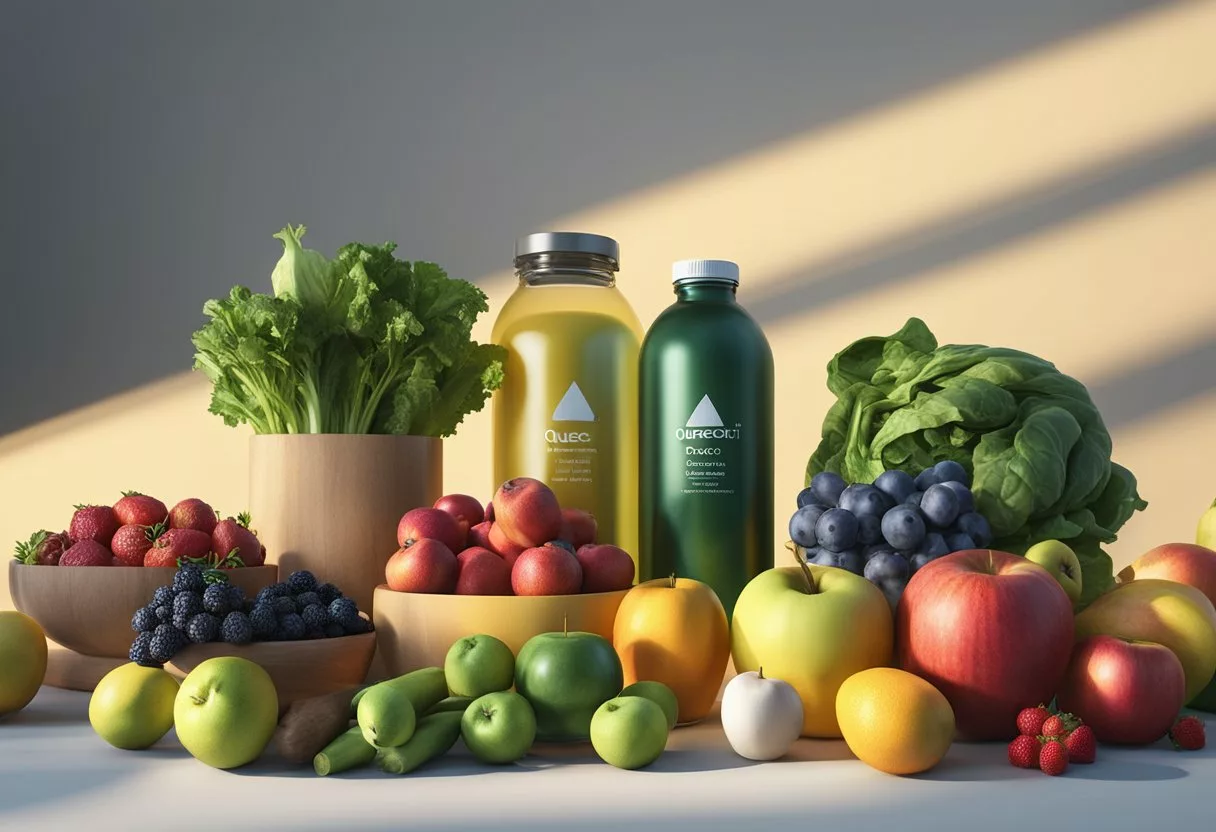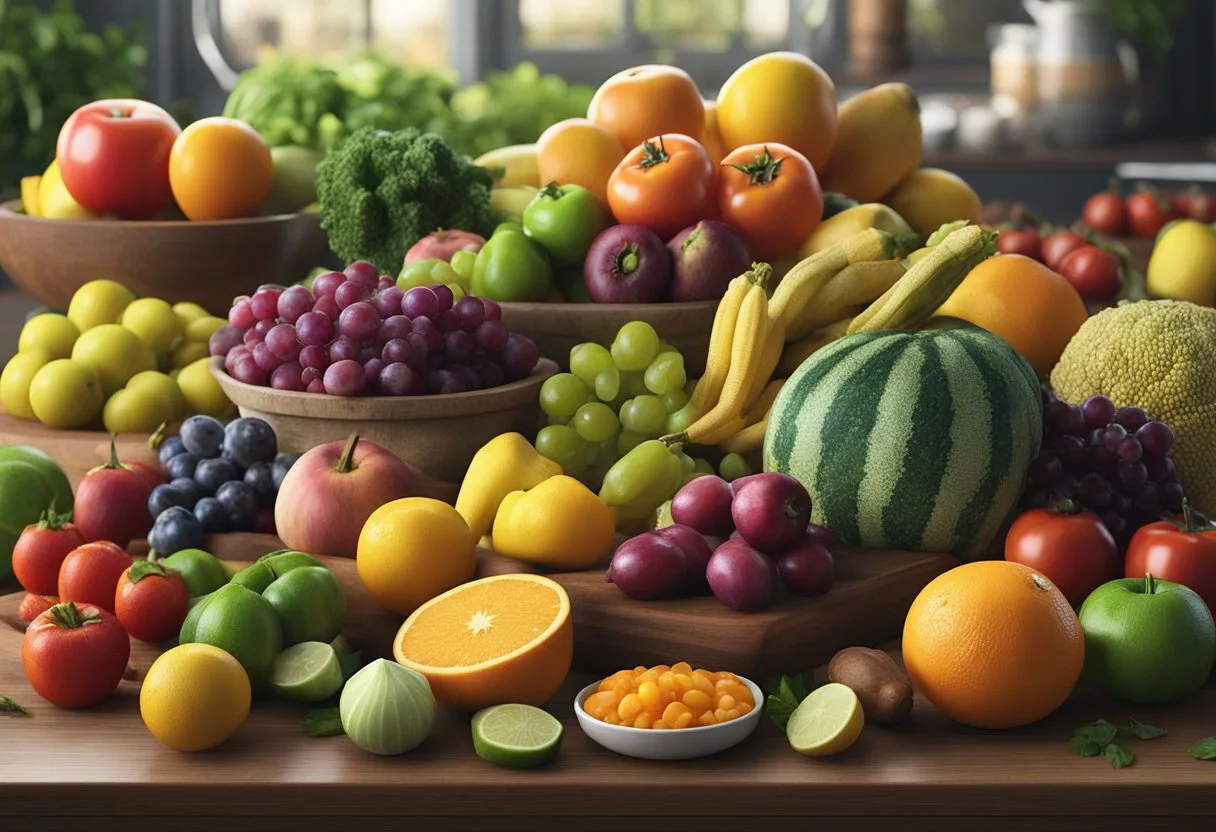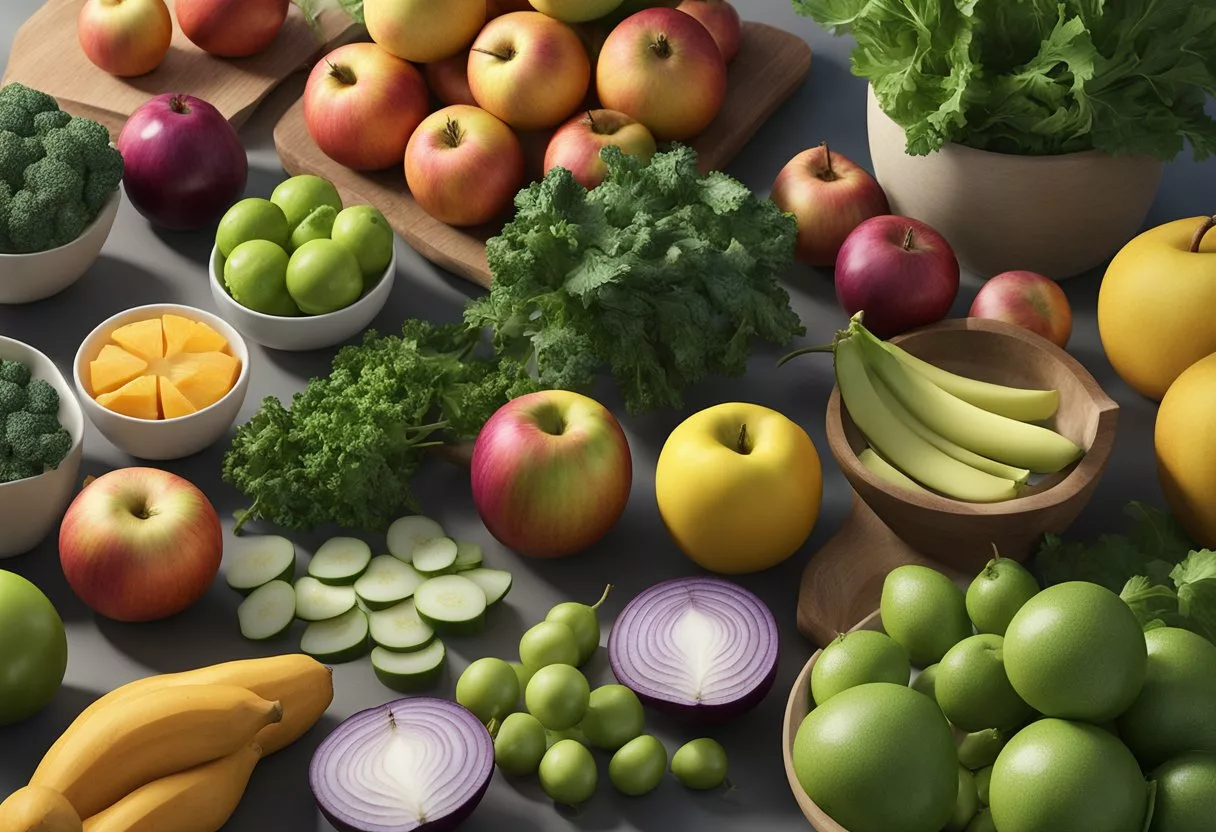Quercetin is a natural compound found in many fruits, vegetables, and grains. It is known for its antioxidant and anti-inflammatory properties, making it a popular choice for those looking to boost their health. Some of the health benefits associated with quercetin include improved heart health, reduced inflammation, and better immune function.
Foods like apples, berries, red onions, and kale are rich in quercetin. By incorporating these foods into your diet, you can easily increase your quercetin intake. Supplements are also available if you find it challenging to get enough from food alone.
While quercetin is generally safe, it’s important to be mindful of potential side effects. Some people may experience headaches or digestive issues. As always, consult with a healthcare provider before starting any new supplement.
Key Takeaways
- Quercetin is an antioxidant found in many fruits and vegetables.
- It offers health benefits like reduced inflammation and better heart health.
- Common sources include apples, berries, red onions, and kale.
What Is Quercetin?
Quercetin is a natural plant pigment and a powerful antioxidant found in various fruits, vegetables, and grains. This section will explore what quercetin is, its presence as a flavonoid, and where it’s found in foods.
Defining Quercetin as a Flavonoid
Quercetin is classified as a flavonoid, a type of phytochemical found in many plants. Flavonoids are known for their antioxidant properties, which help protect cells from damage caused by free radicals.
As an antioxidant, quercetin helps reduce inflammation and supports the immune system. It is often linked to heart health and may even have potential benefits in reducing the risk of chronic diseases. These properties make quercetin a valuable component of a healthy diet.
Sources in Nature
Quercetin is widely distributed in the plant kingdom. It is present in various fruits, vegetables, leaves, seeds, and grains. This broad distribution makes it easy to incorporate into the diet through natural sources.
Plants produce quercetin as a way to protect themselves against damage from ultraviolet light, pests, and other stressors. This natural defense mechanism in plants benefits humans when ingested by providing similar protective effects.
Dietary Presence in Fruits and Vegetables
Quercetin is primarily found in commonly consumed fruits and vegetables. High concentrations are present in berries, apples, and cherries. Vegetables like red leaf lettuce, onions, and asparagus are also rich in quercetin.
Additionally, broccoli is another good source. Regular consumption of these foods can help increase quercetin intake to at least 500 milligrams daily, which is often recommended for optimal health benefits.
By consuming a diet rich in these quercetin-containing foods, one can take advantage of its numerous health benefits. Incorporating a variety of these fruits and vegetables into daily meals can make it easy to reach the desired intake levels.
Health Benefits of Quercetin

Quercetin offers several health benefits such as reducing inflammation, improving blood pressure, and supporting heart health. It may also help with allergies, brain health, immune support, and managing blood sugar.
Antioxidant Effects on Free Radicals
Quercetin is a powerful antioxidant. Antioxidants combat free radicals, which are unstable molecules that can damage cells. This damage contributes to aging and various diseases. By neutralizing free radicals, quercetin helps protect cells and tissues. This protective effect is crucial in maintaining overall health and could lower the risk of chronic conditions.
Anti-Inflammatory Properties and Disease
Quercetin has strong anti-inflammatory properties. Inflammation is a response to injury or infection, but chronic inflammation can lead to diseases like arthritis and heart disease. Quercetin can help reduce this chronic inflammation. Studies suggest it may lower the production of inflammatory molecules, contributing to better health and potentially preventing inflammatory diseases.
Heart Health and Blood Pressure Regulation
Quercetin can support heart health. It helps in the regulation of blood pressure by relaxing the blood vessels, which improves circulation. Lower blood pressure reduces the strain on the heart and decreases the risk of heart disease. Quercetin also lowers cholesterol levels, reducing the risk of atherosclerosis, which is the buildup of fats, cholesterol, and other substances in and on the artery walls.
Potential in Cancer Prevention
Quercetin shows promise in cancer prevention. It may inhibit the growth of cancer cells and help in their elimination. Research indicates that quercetin can induce cell death in certain cancer cells and block some of the pathways cancer cells use to grow. This suggests a potential role in reducing the risk of developing cancer.
Support for the Immune System
Quercetin supports the immune system. It boosts the body’s defense against infections by enhancing immune cell function. It has antiviral properties, helping to fight off viral infections. Regular intake of quercetin may help in maintaining a robust immune system, which is vital for preventing diseases and speeding up recovery.
Effect on Allergies and Blood Vessels
Quercetin can alleviate allergy symptoms. It acts as a natural antihistamine, reducing the release of histamines that cause symptoms like sneezing, itching, and congestion. Additionally, quercetin strengthens blood vessels and improves their flexibility. This helps in the efficient transport of blood and nutrients throughout the body.
Quercetin and Brain Health
Quercetin benefits brain health. It has neuroprotective effects, which means it helps protect brain cells from damage. This can improve cognitive functions and may reduce the risk of neurodegenerative diseases. Quercetin also combats oxidative stress in the brain and enhances memory and learning abilities.
Impact on Blood Sugar and Diabetes Management
Quercetin can help manage blood sugar levels. It improves insulin sensitivity, which is crucial for controlling blood sugar. For people with diabetes, better insulin sensitivity means more stable blood sugar levels. Research indicates that quercetin might lower blood sugar levels, making it beneficial for those managing diabetes.
Nutritional Sources of Quercetin

Quercetin is found in many fruits, vegetables, beverages, and supplements. These sources are essential for maintaining a balanced intake of this beneficial flavonoid.
High-Quercetin Foods
Quercetin is abundant in apples, berries, and cherries. Red leaf lettuce, onions, and asparagus are also significant sources. For those who enjoy vegetables, broccoli, kale, and tomatoes are excellent choices.
Among grains, buckwheat stands out. Additionally, peppers and citrus fruits offer notable quercetin content. Consumption of these foods regularly can help increase quercetin levels naturally.
Beverages Containing Quercetin
Several beverages contain notable amounts of quercetin. Green tea is a popular choice, rich in antioxidants including quercetin. Additionally, red wine and certain varieties of white wine provide quercetin, making them beneficial in moderation.
For those looking for another option, herbal teas made from quercetin-rich plants can be beneficial. Even some fruit juices, especially from grapes and citrus fruits, contribute to daily quercetin intake.
Supplementing with Quercetin
While it is possible to get enough quercetin from a diet rich in fruits and vegetables, some individuals may consider supplements. These supplements generally offer a dosage between 500 and 1,000 milligrams per day.
Quercetin supplements come in various forms, including capsules and powders. They provide a more concentrated dose for those who struggle to get enough from food alone. However, it is always essential to check with a healthcare provider before starting any new supplement to ensure its safety and efficacy.
Quercetin in Clinical Research

Quercetin, a natural flavonoid found in various fruits and vegetables, has been extensively researched for its potential health benefits. This section delves into clinical studies focusing on cardiovascular health, cancer, anti-inflammatory effects, and neuroprotective properties.
Studies on Cardiovascular Benefits
Quercetin has demonstrated significant promise in promoting cardiovascular health. Research shows that quercetin can help reduce oxidative stress, which is a key factor in cardiovascular disease. It may also improve arterial function by reducing arteriosclerosis, a condition where the arteries become clogged with fatty substances. Some studies have explored its role in lowering blood pressure and reducing the risks associated with stroke and heart attacks. Quercetin’s ability to combat oxidative damage and improve vascular health positions it as a potential therapeutic agent for preventing heart disease.
Cancer Research and Quercetin
Quercetin has been studied for its potential anti-cancer properties. Research indicates that quercetin can inhibit the growth of various cancer cells, making it a candidate for cancer prevention and treatment. It appears to induce apoptosis, a process of programmed cell death, in cancer cells without affecting normal cells. Additionally, quercetin can interfere with multiple pathways that tumors use to grow and spread, such as blocking angiogenesis, which is the formation of new blood vessels that supply the tumor. These findings suggest that quercetin could be developed as a complementary therapy for cancer.
Investigating Anti-Inflammatory Effects
Chronic inflammation is a common factor in many degenerative diseases. Quercetin has strong anti-inflammatory properties, which have been tested in numerous clinical studies. It can reduce inflammatory markers in the body, thus preventing or alleviating symptoms of chronic inflammation-related conditions such as arthritis. By modulating the body’s inflammatory responses, quercetin helps mitigate the effects of oxidative stress, leading to overall better health outcomes. Its ability to reduce inflammation has also been linked to improvements in metabolic diseases, including diabetes and obesity.
Exploring Anti-Aging Effects and Neuroprotective Properties
Quercetin is also associated with anti-aging benefits and neuroprotection. It has been observed to protect against cognitive decline and neurodegenerative diseases like Alzheimer’s disease and Parkinson’s disease. The neuroprotective properties of quercetin are attributed to its ability to reduce oxidative stress and inflammation, which are major contributors to neuronal damage. By neutralizing free radicals and reducing inflammation, quercetin may help in delaying the aging process and protecting brain health. Some studies also suggest that quercetin can enhance cognitive functions and memory, making it a promising compound for maintaining brain health as one ages.
Incorporating Quercetin into Your Diet

Quercetin can significantly boost your health by reducing inflammation and supporting your cardiovascular system. Here’s how you can effectively integrate quercetin-rich foods and supplements into your everyday meals.
Daily Intake Recommendations
Most people consume up to 40 milligrams of quercetin daily through fruits and vegetables. For maximum health benefits, aim for at least 500 milligrams per day. This can be achieved by focusing on foods high in quercetin such as apples, berries, onions, and red leaf lettuce. It is also possible to take quercetin as a dietary supplement to reach desired intake levels.
When adding quercetin supplements, it’s crucial to follow product guidelines to avoid exceeding recommended doses. Consulting a healthcare provider before starting supplements is advisable to ensure safety, especially if you have underlying conditions.
Enhancing Quercetin Bioavailability
Quercetin’s bioavailability – how well your body can absorb and use it – is crucial. Cooking can break down quercetin found in foods, making it easier for your body to absorb. Additionally, combining quercetin-rich foods with fats, such as avocados or olive oil, can improve absorption.
Fermenting foods like onions can also increase quercetin levels. Pairing quercetin with vitamin C-rich foods, such as citrus fruits, can further enhance its bioavailability. These methods ensure you get the most out of your quercetin intake.
Quercetin-Rich Recipes and Preparation Tips
One of the simplest ways to add quercetin to your diet is through salads and stir-fries. For example, a mixed berry salad with apples, red leaf lettuce, and a light olive oil dressing delivers a quercetin boost. Grilled asparagus with lemon and a bit of olive oil is another tasty option.
For variety, try a quercetin-rich smoothie using spinach, cherries, strawberries, and a splash of citrus juice. When cooking, use low to medium heat to preserve quercetin content. Incorporating these recipes into your daily meals can be both delicious and beneficial.
Frequently Asked Questions

Quercetin offers a range of benefits, especially in improving antioxidant levels and reducing inflammation. It’s also important to understand where to find it in foods, its potential side effects, and the best ways to take it.
What are the top food sources of quercetin?
Quercetin is primarily found in fruits and vegetables. Key sources include apples, berries, cherries, onions, red leaf lettuce, and asparagus. It’s also present in broccoli and certain teas. Including a variety of these foods in your diet can boost your quercetin intake.
Are there any potential side effects associated with quercetin supplementation?
Quercetin is generally safe when consumed through foods. As a supplement, it appears to have minimal side effects, but some people might experience mild symptoms. Quercetin supplements are safe when taken in reasonable amounts for short periods.
How long does it typically take to notice the effects of quercetin after starting supplementation?
The time it takes to notice the effects of quercetin can vary. Some individuals may see benefits within a few weeks. For others, it might take longer, depending on factors such as dosage and overall health. Consistent use is key to observing any notable improvements.
What are the benefits of quercetin for the skin?
Quercetin has antioxidant properties that can benefit the skin. It may help reduce inflammation and protect against damage from free radicals. This can potentially lead to healthier, more radiant skin.
What are the combined benefits of taking quercetin with bromelain or zinc?
Combining quercetin with bromelain, an enzyme found in pineapples, can enhance its absorption and effectiveness. Pairing it with zinc can support immune health. This combination might improve anti-inflammatory effects, making it a popular choice for those seeking additional health benefits.
Is it more beneficial to take quercetin supplements in the morning or at night?
There isn’t a definitive time that is better for taking quercetin supplements. It largely depends on individual preferences and daily routines. However, some people might prefer taking it in the morning to align with their body’s natural circadian rhythms.